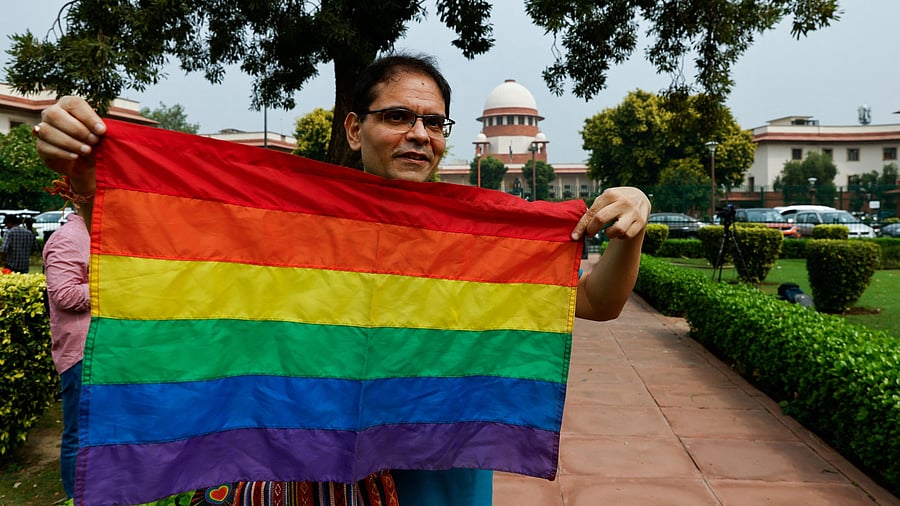
A writer and member of the lesbian, gay, bisexual and transgender community holds the pride flag while waiting to hear the judgement on same-sex marriage by the Supreme Court in New Delhi, India, October 17, 2023.
Credit: Reuters Photo
New Delhi: The Supreme Court judgement on same-sex marriage has brought in rays of hope strung by good intention, even when it did not deliver what they had set out to receive, petitioners in the case said.
Mumbai-based equal rights activist Harish Iyer, one of the petitioners in the case, said that without any directive or deadline, the verdict does not provide succour to anyone. “I think the English was good, the grammar and the syntax of the judgement was on point, but beyond that, it spoke about nothing,” Iyer said.
The only glimmer of hope, Iyer said, was that the court reiterated that trans people can get into marital unions in heterosexual cases. “This has been spoken about in the Navtej Johar judgement which insists on a safe space for queer people,” he added.
Delivering the judgement, a five-member bench headed by the Chief Justice of India, unanimously decided to refuse legal recognition to same-sex marriage under the Special Marriage Act, and said the Parliament should, instead, come up with a legislation to this end. The bench, however, made a spirited plea for equal rights for queer people.
Among the 20 petitioners in the case were a renowned trans activist from Bengaluru, a queer woman who has helmed the Delhi Pride Parade for years, and a vocal supporter of the Sangh.
Political commentator Abhijit Iyer-Mitra, who identifies as an atheist and cultural Hindu, had filed a petition for equal marriage rights under the Hindu Marriage Act, because he says, the legislation defines gender roles but makes no mention of biological sex of the individuals in a marital union. “From the manner in which the arguments were unfolding, it was clear what the judgement would be,” he said.
Iyer-Mitra said his interjections with the RSS as well as the government had elicited positive responses which has led him to believe that the case of marriage equality for the LGBTIQ+ community could be tackled if the government takes up the Uniform Civil Code. He added that if the government indeed does so, he will petition for the inclusion of the case of marriage equality for the queer community.
Iyer said that one of the positive outcomes of the verdict is that people, both from within and outside the community, now know the difference between sexuality and gender. “The arguments and the verdict have been an educational excursion for us all,” he said.
However, not all petitioners were as positive. Filmmaker Onir said that the verdict was “disappointing”. “When the hearing started, they were really making good points. The suggestions that they gave to the police department for the implementation of the safety of LGBTQI people are very important,” he said.
But soon after, he said, the apex court left it to Parliament. “The court takes decisions on human rights, but the government takes decisions on the idea of how to get more votes,” he said.